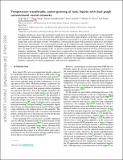| dc.contributor.author | Ruza, Jurgis | |
| dc.contributor.author | Wang, Wujie | |
| dc.contributor.author | Schwalbe-Koda, Daniel | |
| dc.contributor.author | Axelrod, Simon | |
| dc.contributor.author | Harris, William H | |
| dc.contributor.author | Gómez-Bombarelli, Rafael | |
| dc.date.accessioned | 2022-05-13T15:34:27Z | |
| dc.date.available | 2022-05-13T15:34:27Z | |
| dc.date.issued | 2020 | |
| dc.identifier.uri | https://hdl.handle.net/1721.1/142527 | |
| dc.description.abstract | © 2020 Author(s). Computer simulations can provide mechanistic insight into ionic liquids (ILs) and predict the properties of experimentally unrealized ion combinations. However, ILs suffer from a particularly large disparity in the time scales of atomistic and ensemble motion. Coarse-grained models are therefore used in place of costly all-atom simulations, accessing longer time scales and larger systems. Nevertheless, constructing the many-body potential of mean force that defines the structure and dynamics of a coarse-grained system can be complicated and computationally intensive. Machine learning shows great promise for the linked challenges of dimensionality reduction and learning the potential of mean force. To improve the coarse-graining of ILs, we present a neural network model trained on all-atom classical molecular dynamics simulations. The potential of mean force is expressed as two jointly trained neural network interatomic potentials that learn the coupled short-range and many-body long range molecular interactions. These interatomic potentials treat temperature as an explicit input variable to capture its influence on the potential of mean force. The model reproduces structural quantities with high fidelity, outperforms the temperature-independent baseline at capturing dynamics, generalizes to unseen temperatures, and incurs low simulation cost. | en_US |
| dc.language.iso | en | |
| dc.publisher | AIP Publishing | en_US |
| dc.relation.isversionof | 10.1063/5.0022431 | en_US |
| dc.rights | Attribution-NonCommercial-ShareAlike 4.0 International | en_US |
| dc.rights.uri | https://creativecommons.org/licenses/by-nc-sa/4.0/ | en_US |
| dc.source | arXiv | en_US |
| dc.title | Temperature-transferable coarse-graining of ionic liquids with dual graph convolutional neural networks | en_US |
| dc.type | Article | en_US |
| dc.identifier.citation | Ruza, Jurgis, Wang, Wujie, Schwalbe-Koda, Daniel, Axelrod, Simon, Harris, William H et al. 2020. "Temperature-transferable coarse-graining of ionic liquids with dual graph convolutional neural networks." The Journal of Chemical Physics, 153 (16). | |
| dc.contributor.department | Massachusetts Institute of Technology. Department of Materials Science and Engineering | |
| dc.relation.journal | The Journal of Chemical Physics | en_US |
| dc.eprint.version | Author's final manuscript | en_US |
| dc.type.uri | http://purl.org/eprint/type/JournalArticle | en_US |
| eprint.status | http://purl.org/eprint/status/PeerReviewed | en_US |
| dc.date.updated | 2022-05-13T15:21:21Z | |
| dspace.orderedauthors | Ruza, J; Wang, W; Schwalbe-Koda, D; Axelrod, S; Harris, WH; Gómez-Bombarelli, R | en_US |
| dspace.date.submission | 2022-05-13T15:21:23Z | |
| mit.journal.volume | 153 | en_US |
| mit.journal.issue | 16 | en_US |
| mit.license | OPEN_ACCESS_POLICY | |
| mit.metadata.status | Authority Work and Publication Information Needed | en_US |
